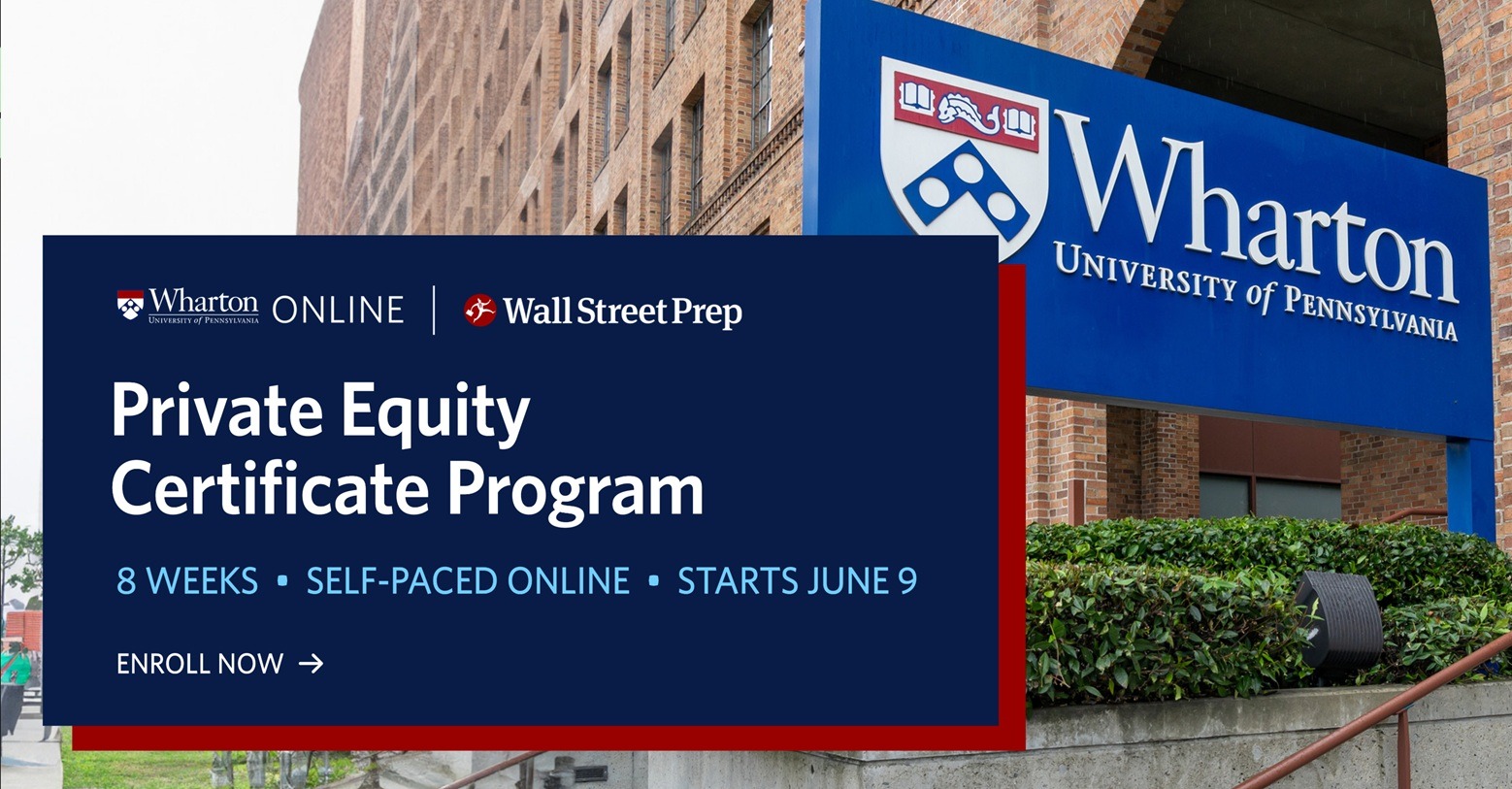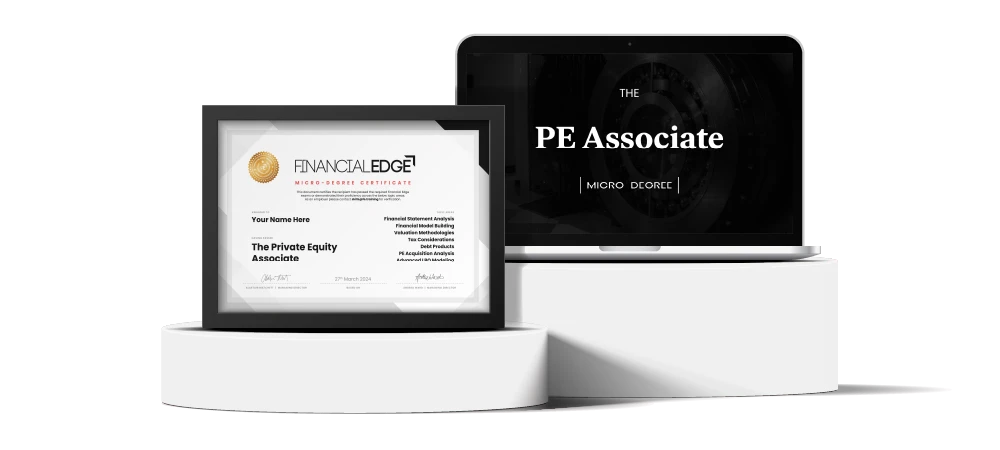Over USD 1.2 trillion were raised by global private equity funds last year. This is an industry that sees no signs of stopping and with new deals pouring in at a healthy pace, I only expect it to grow for the foreseeable future.
Private Equity funds need an army of associates and other professionals to keep the wheels of commerce spinning. They need experts who know more than just finance. They need people who understand how businesses work, how they add value, and how they generate returns.
A good Private Equity course has to be more than just valuation and modelling. While those are important topics, I consider them to be the basic datum. A sort of bare minimum. To add value, you must go beyond that. The competitiveness of this industry further reinforces that need to go beyond the bare minimum.
These courses have been selected specifically to help you do just that. They are relevant, they push the boundaries of what you need to know and I have selected them to prioritize the personal brand building opportunities that candidates surely need to make it in this competitive industry.
1. The Private Equity Investing Certificate Program from Wharton and Wall Street Prep
(Note: Use the above link and code BANKERSBYDAY for $300 off tuition on this course)
Who is this for?
Investment bankers, investment managers, PE professionals including analysts, lawyers, consultants, family offices making private investments, business/ finance students.
Course Review
If you have been looking for solid PE courses, you have probably already realized that they are a lot harder to come by than most other finance topics. This is because Private Equity is a highly specialized niche that only the very best aspire to. Even among investment bankers, PE is considered an aspirational career destination.
About 5-6 years ago, I worked with a few HNIs in London doing financial due diligence on their medium-sized PE deals. I could definitely see the attraction but I also came up against a brick wall. While the fundamentals of analysing the business remain the same, the investment goals and financing and deal structures changes. Not to mention the fact that PE investors themselves add value to their invested companies in a way that cannot really be compared with anything else. In fact, I have been on both sides of this equation and built a really specialized skill set that is very hard to come by in most courses.
The point I am trying to make with all this is that you need more than just a generic finance course to make it in PE. You either need real deal experience or you need a course that has been specifically designed to give you the closest you can get to real deal experience. What does that entail? That means PE professionals talking about the deals that they have executed, detailed case studies that capture the nuances and intricacies of these complex deals, and a thorough discourse on all the little things that PE professionals do that combine together to make the magic work.
This is what this highly specialized course has been designed to achieve. Wharton and Wall Street Prep have joined forces to create something that combines the best of both words. You benefit from the academic excellence of Wharton with detailed case studies and study material and you get practical experience of Wall Street Prep who have been training finance professionals at some the top PE and IB firms for decades now. Here are some of the people you will hear speak:
Notable Guest Speakers: David Rubenstein (Co-Founder and Co-Chairman of the Board, Carlyle Group), Martin Brand (Head of North America Private Equity, Blackstone), Scott Graves (Co-Head of Private Equity, Ares Management)
I am a big fan of David Rubinstein and the interviews he does for the The Economic Club of Washington are some of my favourites. Cant recommend him enough.
Firm Sponsors: KKR, Blackstone, Carlyle, Thoma Bravo and more
Now moving on to the course curriculum, it is divided into several modules that cover the intricacies of the PE asset class, investment framework, deal process and structure, LBO modelling, due diligence and the PE operating model. I suggest you download the course brochure using the link below if you want to go through the curriculum in more detail. From my perspective, I can tell you that this is a comprehensive course that covers the topic from all angles. In fact, I think there are some extra topics here for some participants, but when it comes to learning, it is always better to have more than to have less.
Click here and use code BANKERSBYDAY for $300 off tuition on this course
Summary
| Duration | 8 weeks, at around 8 hours weekly |
| Format | Fully online, self-paced |
| Level | Professional |
2. The Private Equity Associate from Financial Edge
(Note: Use code BBD25 for 25% off at Financial Edge)
Course Review
 Financial Edge is an elite training provider that trains staff at some of the world’s top investment banks. As such, you can expect the highest quality and personal brand enhancement from them, and based on my own experience with their certifications, they deliver on both fronts. Because of extensive usage of Financial Edge in-house training sessions in the finance industry, they have built a sort of brand recognition that helps their graduates stand out.
Financial Edge is an elite training provider that trains staff at some of the world’s top investment banks. As such, you can expect the highest quality and personal brand enhancement from them, and based on my own experience with their certifications, they deliver on both fronts. Because of extensive usage of Financial Edge in-house training sessions in the finance industry, they have built a sort of brand recognition that helps their graduates stand out.
The online version of the courses is the same quality as their in-house version. You get access to the same quality course material from top industry experts with the same rigour and thoroughness. You also have to complete an online quiz at the end of most modules to earn your certification and this is a really good thing as it signals to recruiters that you have passed the same rigorous exam. Use this certificate to spruce up your LinkedIn profile, CV or in other professional settings.
The course content is really comprehensive and covers pretty much everything a Private Equity associate needs to know. From LBO modelling to acquisitions finance and from PE acquisitions analysis to credit committees and financing instruments. This course has it all. I am not going to spend much time just relisting the entire table of contents here, so I highly suggest you click on the below link to check out the course curriculum. But in short, you will cover aspects ranging from tax considerations to basic modelling and financial analysis and valuation skills while also dealing PE specific topics.
I want to focus more on the quality of the course content and effectiveness. The videos are great with insights from real world experts rather than just academic theory. That’s one of the advantages of such courses as you are learning from industry professionals about things they do in the real world. You have a whopping 300 practical exercises as part of this course and those should be more than enough to get you up to speed. You also get direct instructor help and access to the online community and even recruiter services.
Click here and use code BBD25 for a 25% discount on all Financial Edge courses!
Summary
| Duration | Around 55 hours |
| Format | Fully online, on-demand |
| Level | Professional |
3. Oxford Private Markets Investments Programme
Course Review
Private Equity is one of the pinnacles of finance. Even top investment banking analysts find it hard to break in. You need every edge you can get. This certified program from Oxford is one of the best ones covering PE, especially from a personal brand building perspective. So if you need the CV boost to break in, this is your best bet. You get a certification from Oxford that you can use to add value to your LinkedIn profile or CV.
This is the most comprehensive course on PE and the creators have gone out of their way to ensure you get the best possible value for your money. Just take a look at what all you get in addition to the typical videos and course material:
- Insights from over 40 global PE industry experts
- Interactive sessions including role play and Oxford Union style debates
- Access to case studies and tools like Preqin (private market data source)
- Access to the Oxford Executive Education Alumni Group on LinkedIn (only on successful completion). Think of all the networking opportunities.
Its value-added goodies like this that make these courses worth the asking price. You are not just paying for a couple of videos, but all this extra stuff that gets you across that final mile.
In terms of topic coverage, there are several modules which each cover some important aspect of private Equity markets. You start of with a basic introduction and “learning the lingo” of the industry. Sources of capital, key PE market participants and their roles, how assets are traded in the private market, lifecycle of a deal and market characteristics and trends.
Then you move on to the process of asset acquisitions meaning valuation, financial modelling, leverage and exit strategies. This is followed by a module on structing, including the fundraising process, agreements, legal considerations, negotiation etc. Performance evaluation also gets a module of its own.
There is no point in listing each topic that is covered, I suggest you download the brochure by clicking on the link below. But the ones that stood out to me the most were environmental, social, and governance (ESG) issues in private markets as it is a relatively new topi, and their take on what is a role model in this industry – in terms of optimal performance.
Click here and use code GS-AF-BBD15 for a 15% discount on this course!
Summary
| Duration | 6 week with 7-10 hours a week |
| Format | Fully online, on-demand |
| Level | Executive |
4. Private Equity Masterclass from Wall Street Prep
Course Review
Academic courses are well and good, but who better to teach you Private Equity than the people who do it for a living? Wall Street Prep is a well known training provider in the financial services industry and trains bankers at some of the world’s top investment banks and private equity firms like Goldman Sachs, Evercore, Morgan Stanley, Lazard, JP Morgan, Moelis, KKR, Bain Capital, The Carlyle Group etc.
Yes, you heard that right. You can now learn PE from the people who run the training classes at PE firms!
These courses have been designed for business students and young professional looking to break into PE and also for people who are just about to join a PE firm (which is why PE firms use it to help their hires hit the ground running). Bankers working with PE firms will also find it useful as will anyone who has to be a part of a PE deal in a significant capacity.
There are three modules that are part of this package. LBO modelling, the private equity deal process and LBO modelling in the lower middle market. I am not going to list the entire table of contents here as you can just check it on their site,. I would rather just talk about its quality, completeness and relevance. The lessons are dived into bite sized segments that are explained in easy to digest video format. Things are explained from a practical standpoint, rather than just the theory. There is a comment section underneath each of these videos where students can ask all sorts of questions and I found that feature very useful since there is always something there that you may have otherwise missed.
There are a lot of models, case studies and exercises to help you cement your learning. There are plenty of little tid-bits that make you feel like this is an actual PE professional explaining their job to you. I really like that.
This is certainly one of the best courses you can take to learn about how the world of private Equity actually works on a day to day basis. If you trying to get in at an entry or internship level, this is a great option.
Click here and use code BANKERS for a 15% discount on Wall Street Prep!
Summary
| Duration | Around 15 hours |
| Format | Fully online, on-demand |
| Level | Intermediate |
5. Certified Financial Modeling & Valuation Analyst (FMVA) from CFI
Course Review
The FMVA is a popular certification that has rapidly been gaining traction in the financial services industry. While the name suggests that the FMVA focuses primarily on modelling and valuation, the fact is that it is a highly customization certification with optional electives that you can pick to tailor the offering as you choose.
The two best features of this certification is the modular nature and the very easily digestible content delivery. They almost make it seem easy with the videos explain complex financial concepts things in a way that is easily palatable to most. The content is delivered why small lessons (there are over 1500 lessons) which makes it easier to plough through along with 170 interactive exercises.
Now let’s talk about the other great feature – the modularity. You star with the basic prep courses, but these are entirely optional. You can complete ones that you feel you need to and skip the rest. This includes stuff like accounting fundamentals, corporate finance basics, Excel basics and so on.
This is followed by your core courses. These are the ones that are core to most finance roles, and you need to complete them all. This includes topics like financial analysis, accounting principles, business valuation, cash flow forecast, scenario and sensitivity analyses, data visualizations and making pitchbooks, professional ethics and such. This should give you a very solid foundation to build on.
Now comes the fun part where you can choose electives to tailor the certification for private equity or any other role really. Fancy some Leveraged Buyout (LBO) modelling? Sure. Want to focus on real estate deals instead? They got you covered. Rather spend time on more case studies? You can do that too. Pick what you want and make the most of it.
Click here and use code BBD10 for a 10% discount on all CFI courses!
Summary
| Duration | Around 100 hours |
| Format | Fully online, on-demand |
| Level | Intermediate |
6. Private Equity and Venture Capital from the University of Bocconi
Course Review
This course from the University of Bocconi focuses specifically on private equity and venture capital. It’s a relatively short course that assumes you know the basics of finance and only focuses on the more specific topics that relate to private equity. You do get a shareable certification on completion that you can use to showcase your newly acquired skills and expertise to potential recruiters or your boss.
The first few hours are spent on understanding the private equity industry which means topics like fund life cycle, expansion and replacement financing, seed and early-stage capital and so on. You quickly move on to legal and tax issues as that is indeed one of the areas where you will spend most of your time in a private equity role. Topics like management fees and carried interest, firm structures like limited partnerships in the US or investment firms in the EU, VCTs in the UK, SPACs, SBICs and so on.
Next, we move on to the core topics like fundraising, deal making, decision making process, supporting and monitoring the invested companies, dealing with covenants etc. there are also some interviews here with experts to give you additional insights. Company valuation and deal making is the focus of the next module. Along with several interviews with real world experts that have been included to provide you with something extra.
Check Course Curriculum and Apply
Summary
| Duration | Around 10 hours |
| Format | Fully online, on-demand |
| Level | Beginner |
7. Advanced Valuation and Strategy – M&A, Private Equity, and Venture Capital from Erasmus University Rotterdam
Course Review
This is another short course that focuses on valuation and strategy for private equity, venture capital and other deal types. You start off by learning the basics like the source of value in such deals, why and how to use DCF valuation method, WACC , IRR, APV and other tools that are used in financial valuation extensively. This lays the groundwork for more strategic topics to come.
This is when you move on to corporate strategy which is all about linking financial valuation to corporate strategy. PE is not just about valuation figures, but you also have to figure out how the deal fits into your overall strategy and how you can generate extra value by completing a deal.
The last few hours are focuses on real options. This is more of a strategy thing rather than crunching numbers because you look at how decisions are made with regards to projects, whether the flexibility of not rushing into a deal to early is worth it and decision points of this nature. This is more of an abstract topic but crucial to business decision making nonetheless so its good to see them focus on it.
Check Course Curriculum and Apply
Summary
| Duration | Around 16 hours |
| Format | Fully online, on-demand |
| Level | Beginner |



